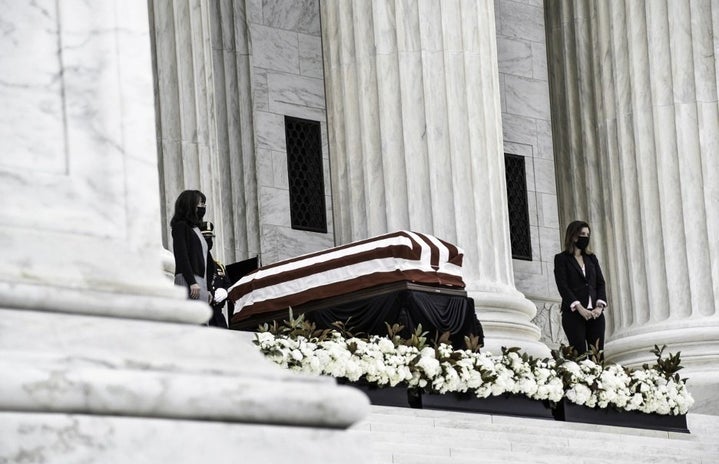On the first eve of Rosh Hashanah, Supreme Court Justice and groundbreaking cultural icon Ruth Bader Ginsburg passed away at 87.
The significance of her passing on the first night of the Jewish New Year hearkens back to traditional Jewish spirituality.
“If one dies on any Shabbat they are considered a Tzadik … more so when it’s on the new year,” Rabbi Andrea London of Beth Emet synagogue in Evanston, Illinois told USA TODAY.
A Tzadik is a is a form of the Hebrew verb צדק [TzDK], meaning a person considered righteous, or “one who embodies the Creator’s primal conception of the human being.”
Her identity as a Jewish woman heavily influenced the lens through which she viewed the treatment of those outnumbered by the majority.
Faced with adversity and discrimination throughout her life, Ginsburg held a strong sense of empathy for minority groups.
“The Jewish religion is an ethical religion. That is, we are taught to do right, to love mercy, do justice, not because there’s gonna be any reward in heaven or punishment in hell. We live righteously because that’s how people should live and not anticipate any award in the hereafter,” Ginsburg told an audience of Rosh Hashanah celebrators in Washington in 2017, according to the Associated Press.
Growing up, Ginsburg carried a heightened awareness of the oppression and violence endured by victims of the Holocaust and World War II, greatly shaping her views of human rights.
“The sense of being an outsider — of being one of the people who had suffered oppression for … no sensible reason … it’s the sense of being part of a minority. It makes you more empathetic to other people who are not insiders, who are outsiders.” Ginsburg told Jane Eisner, then editor-in-chief of the Forward.
Ginsburg was a living breathing symbol of justice. She pursued equality for all people under the law, and did so through humility and fierce, powerful work.
Amid heated debates and controversy regarding the confirmation of a new Justice, thousands paused their politics to grieve the loss of this trailblazing feminist icon.
Rather than proceed with a traditional service within 24 hours of passing, Ginsburg brought her Jewish tradition to the heart of Washington D.C., displayed for mourners to pay their respects.
Rabbi Lauren Holtzblatt began the service with a Jewish blessing, “Baruch dayan ha’emet,”
“Blessed is God, the true Judge.”
Ginsburg lay in state outside the U.S. Capitol, the first Jewish woman to receive the honor.
Her legacy will continue to live on through the roads she paved for gender equality, and the stand she took for women everywhere throughout her life.
A phrase from Deuteronomy, a book in the Tankah, or Hebrew Bible, now hangs on the wall of the Supreme Court in her memory. It reads:
“Justice, justice you shall pursue.”



